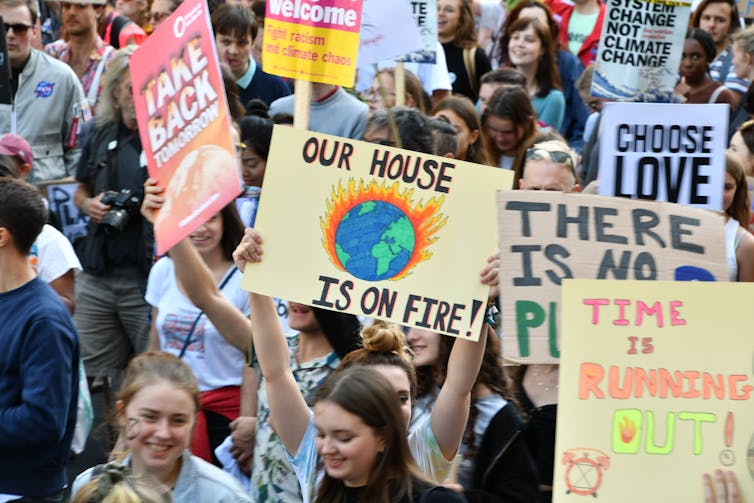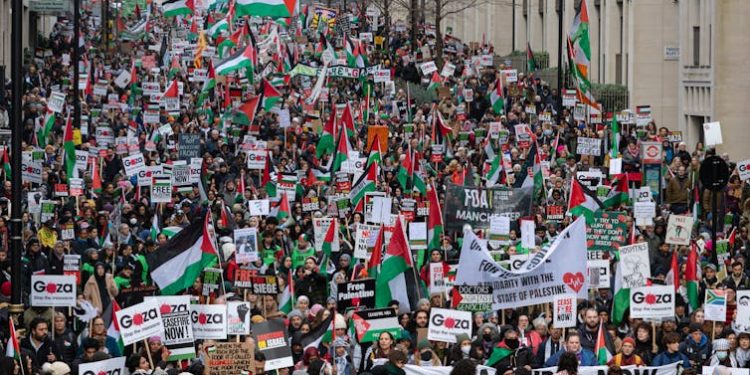David J. Bailey, University of Birmingham
The current global wave of protest calling for a ceasefire in Gaza has included mass demonstrations, street blockades, and efforts to disrupt arms manufacturing. This continues a decade-long trend of rising protest around the world, save for a temporary decline during the pandemic.
Somewhat ironically, with so much collective action, those taking part in protests are often challenged with scepticism and the question: “It doesn’t make a difference, so why bother?” This appears to be the view of the UK’s home secretary, James Cleverly, who said recently: “The question I ask myself is, ‘What are these protests genuinely hoping to achieve?’ … They’re not really saying anything new.”
Most of the UK public believes that protests rarely, if ever, make a difference. While young people are the most optimistic, around half of younger adults believe it is unlikely to do so.
Protests do work
This is surprising, given that we constantly see examples where protest has made a difference. We have, already in 2024, seen blockades and protests by French farmers prompt the government to offer concessions. Likewise, in India, the renewed farmers movement marching towards Delhi has already prompted an offer from the government of improved prices for crops.
Mass street protests over a child sex abuse scandal in Budapest recently led Hungary’s prime minister, Viktor Orbán, to introduce legislation to address the scandal. Late last year, mass protests and street blockades in Panama led to the government closing one of the world’s largest copper mines.
Academic research also shows that protest can be influential. Workers’ protest and strike action was crucial in prompting Franklin Roosevelt’s New Deal as part of the creation of the US welfare state. And disruptive protests have also slowed down the adoption of the austerity measures which have eroded welfare states across the high-income democracies for the past 40 years.
Colonialism was met with ongoing resistance and protest in almost every instance, including Gandhi’s campaign of non-violent civil disobedience, as well as more militant campaigns. This grew throughout the 20th century, until maintaining occupation ultimately proved unmanageable for the colonial powers.

Given all this evidence, why do many people remain convinced that protest is ineffective?
One possible reason is that many of the underpinning motives for protest – exploitation, racism, patriarchy, and the poor quality of democracy – are systemic problems, that many argue are byproducts of capitalism. These problems can be challenged through collective action, but only eradicated through system-wide change, which is obviously far more difficult to achieve.
This can create the appearance that, while protests may prompt political and social reform, the status quo, broadly speaking, remains impossible to change.
Colonialism was met with ongoing resistance and protest in almost every instance, including Gandhi’s campaign of non-violent civil disobedience, as well as more militant campaigns. This grew throughout the 20th century, until maintaining occupation ultimately proved unmanageable for the colonial powers.
The key to effective protest movements
There is also, of course, some truth to the scepticism. Protest is not a panacea. Sometimes it results in desired political and social change, other times a compromise is reached. And sometimes, it can prompt repression and coercion, resulting in a worse outcome altogether.
In recent research, I have explored the impact of the many different protests and campaigns that took place in the UK during the 2010s. I have identified a number of factors that determine the most effective protests.
1. Disruption
While disruptive protest can be unpopular, there can be no doubt that it is effective. One of the most successful environmental campaigns of the 2010s was the anti-fracking movement, in which protests physically obstructed or interfered with the fracking operation, to the degree to that it could not proceed. Eventually fracking was abandoned altogether.
But disruption also brings the risk of repression. Three anti-fracking protesters were given prison sentences, although these were subsequently overturned. Since the pandemic, the UK government has introduced repressive measures which further criminalise disruptive protest.
If you are worried about how you might be treated if you attend a protest, the independent legal rights organisation Green and Black Cross has put together a useful guide to your protest rights.
2. Political support
Protest has the potential to put issues on the political agenda. But it often requires sections of the political elite – normally opposition parties – to take up those issues, and pressure the government into taking action.
Last year in Georgia, anti-government protests erupted against a so-called “foreign agents law” which penalised foreign-owned or foreign-funded media outlets and NGOs and was widely seen as a pro-Russian move. The protests were buoyed by the encouragement of the president Salome Zurabishvili, an independent. She promised to veto the bill, eventually forcing the government to withdraw the proposed legislation.
3. Persistence
While single protest events can take place without producing the desired outcome, campaigns that make a difference often require action over many days, weeks, or sometimes years.
To take one example, in 2018 the Royal Bank of Scotland announced it would stop funding new coal projects worldwide, after a decade-long campaign of protest by climate change activists.
Why take part
The movement for a ceasefire in Gaza might feel as if it is having little effect, especially when we see daily the devastating destruction of human life. Yet, partly as a result of such action, political divisions among those supporting the Israeli government are beginning to show. Even the US is beginning to talk of a ceasefire. Protest cannot be ignored indefinitely.
Even when protest doesn’t lead to immediate political or social change, there are other positive consequences of taking part. Protest activity can be empowering, and provide the skills and networks necessary to participate in future political activity. Research shows that the effects of participating in protest can have a longstanding impact on the lives of those who take part.
David J. Bailey, Associate Professor in Politics, University of Birmingham
This article is republished from The Conversation under a Creative Commons license. Read the original article.











